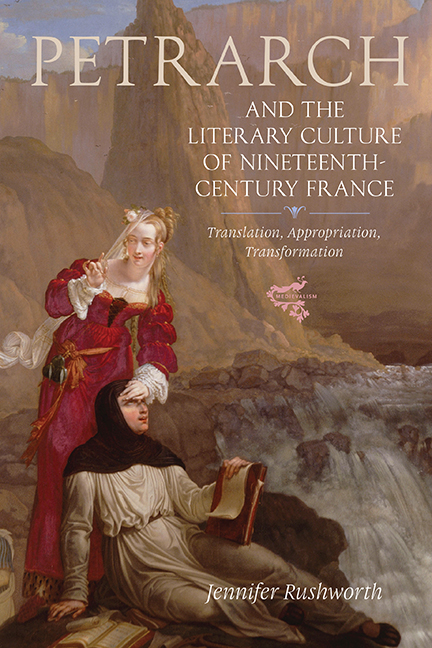 Petrarch and the Literary Culture of Nineteenth-Century France
Petrarch and the Literary Culture of Nineteenth-Century France Book contents
- Frontmatter
- Dedication
- Contents
- Acknowledgements
- Note on English Translations
- Introduction: Local History, Local Stories
- I Translations
- II Rewritings
- 5 Petrarch in Poetry
- 6 The Novelization of Petrarch
- Conclusion: Petrarch and Patriotism
- Appendix 1 A Chronological Survey of Translations of Petrarch's Italian Poetry (the Canzoniere and Triumphi) between 1764 and 1903 in France
- Appendix 2 Translations of the Opening Stanza of RVF 126 from Voltaire (1756) to Brisset (1903)
- Bibliography
- Index
- Miscellaneous Endmatter
5 - Petrarch in Poetry
from II - Rewritings
Published online by Cambridge University Press: 09 May 2017
- Frontmatter
- Dedication
- Contents
- Acknowledgements
- Note on English Translations
- Introduction: Local History, Local Stories
- I Translations
- II Rewritings
- 5 Petrarch in Poetry
- 6 The Novelization of Petrarch
- Conclusion: Petrarch and Patriotism
- Appendix 1 A Chronological Survey of Translations of Petrarch's Italian Poetry (the Canzoniere and Triumphi) between 1764 and 1903 in France
- Appendix 2 Translations of the Opening Stanza of RVF 126 from Voltaire (1756) to Brisset (1903)
- Bibliography
- Index
- Miscellaneous Endmatter
Summary
THIS CHAPTER ARGUES for the Petrarchan inspiration of a number of nineteenth-century French poets, both canonical and less well-known. In the latter camp, we encounter several translators discussed in Part I, who were also poets in their own right. The question here is whether their experience of translating Petrarch might have discernibly influenced their own poetry, and in what ways. This question is the subject of the first part of this chapter (‘Translators as Poets’), while the second part—‘Anniversary Celebrations and Poetry Competitions’— treats the allied topic of poems written for the Petrarchan centenary festivities which span this century (in particular, those of 1874 and 1904). These anniversary poems were at times written by some of the same translators of Petrarch, as well as being the product of poetry competitions with Petrarchan themes.
The second half of this chapter is devoted to the Petrarchan inspiration of canonical French poets, beginning with Lamartine, whence a distinctively Romantic Petrarch emerges. As already noted in the Introduction, Lamartine had a special relationship with Petrarch, both genealogical—via his mother and the abbé de Sade's family tree—and intellectual, leading him to write passionately about Petrarch in his Cours familier de littérature (1856–69). Lamartine's affinity with Petrarch extended, as I demonstrate in this chapter, to his activity as a poet, with a number of his poems having been written in the margins of various editions of Petrarch which he owned (hence the title of this section, ‘In the Margins’). The final part of this chapter, ‘In the Canon’, continues the exploration of a canonical Petrarch, by considering the attitudes towards Petrarch expressed in the poetry and prose of Victor Hugo, Alfred de Musset, and Théophile Gautier. In particular, the latter two share a fascination with Petrarch's coronation on the Capitol, inspired by Louis Boulanger's depiction of this same scene in Le Triomphe de Pétrarque (The Triumph of Petrarch), a large-scale painting commissioned by the marquis de Custine and exhibited at the Paris Salon of 1836. Despite Hugo's eventual preference for Dante, all three poets, along with Lamartine, confirm and consolidate Petrarch's place in French Romanticism. As for the later part of the nineteenth century, it is primarily up to Petrarch's translators, in combination with the organizers of the 1874 and 1904 celebrations held in Avignon, to perpetuate this newly re-established French poetic Petrarchan tradition.
- Type
- Chapter
- Information
- Petrarch and the Literary Culture of Nineteenth-Century FranceTranslation, Appropriation, Transformation, pp. 137 - 186Publisher: Boydell & BrewerPrint publication year: 2017
